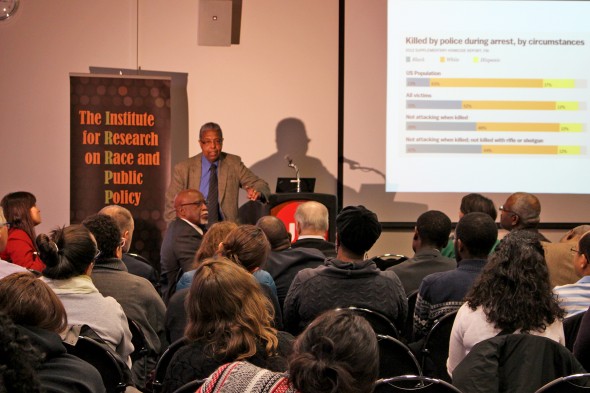Scholar calls for social equality, reparations

Duke University scholar William A. Darity Jr. shared his research on race and politics during the annual Phillip J. Bowman Lecture March 13. (Photo: Iván Arenas)
“Prejudice has been seared into the minds of whites,” said William A. Darity Jr., a noted economics and public policy scholar, during his speech March 13 on the need for reparations and social equality for black Americans.
Darity shared his decades of research on race and politics during the annual Phillip J. Bowman Lecture on Race, Ethnicity, and Public Policy, sponsored by the Institute for Research on Race and Public Policy.
“Unjust treatment of blacks in the U.S. is a national problem,” said Darity, the Samuel DuBois Cook Professor of Public Policy, African and African American Studies, and Economics, and director of the Samuel DuBois Cook Center on Social Equity at Duke University.
“It has always been a problem.”
He highlighted the infamous “40 acres and a mule,” a broken promise by the U.S. government that was purported to give all black families startup property after slavery.
“Denial of black ownership has led to the low amount of black homeowners,” Darity explained, illustrating how past injustices against black people negatively affect them today.
He continued his theme of cause and effect when speaking about “white terrorism,” which he defined as “blacks still belonging to whites,” where white people in positions of power implement laws to keep black people subordinate.
One example he cited was the dual educational system under Jim Crow laws, when black schools were given lower funding and teachers had poor training. Another example was urban renewal, or gentrification, with affluent black communities being destroyed under the guise of being slums in order to ensure “devaluation of black lives through public policy,” he said.
Darity reminded the audience of the 1958 Tuskegee syphilis experiment, when black men with syphilis were left untreated so doctors could examine the virus, resulting in the loss of black lives. He noted that black lives continue to be endangered today by national phenomena such as police brutality.
“Black lives have not mattered since slavery,” he said. “Some might argue that they may have mattered more then.”
Categories
